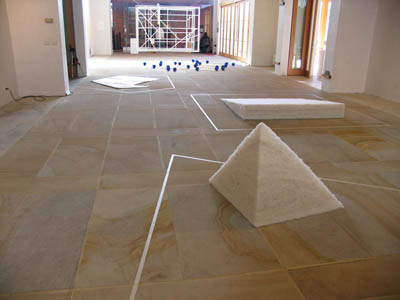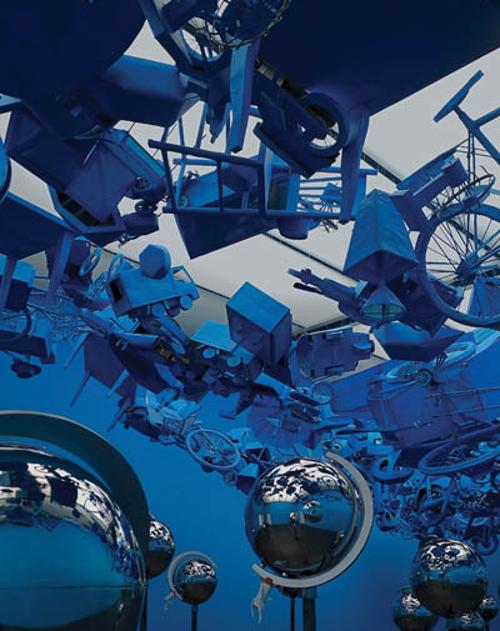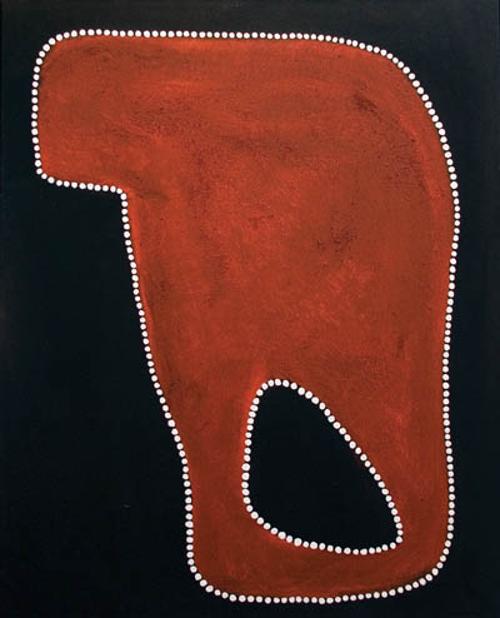
The initial security of modernist objectivism dissolves and evolves as I negotiate the space, look up, look down, look through, move in, move back, align, realign, encircle. I am brought into awareness of the specificity of my body, my gaze, my curiosity, my response and my responsibility.
The hanging conventions waver, engaging the often-unacknowledged spaces between solid elements that in other circumstances might appear to constitute 'the work'. In the interconnections of object, fluidity and pauses, a conversation, a game, a dance is energised. Playfulness is an unanticipated surprise.
Lettau manifests in-between space that, ironically, we can wander through, tracking, tracing, taking care, breathing in and out. Drawing, painting, objects, projections, suspensions and constructions envelop the surrounding air. The works, together in their relationship, space, art history and time, build an enlivened complexity.
This work resonates with a European sensibility. Indeed, Lettau is of German descent, immigrating to Tasmania from Switzerland when she was eighteen. This (dis)placement resonates in her reflections on Wolfgang Laib's intense pollen 'transcendent offerings&to being and the nothingness that forever brackets it' and Maria Nordman's work described as 'an endless process of finding and losing oneself'. However, in the catalogue essay, art historian Ian McLean describes the works' unhomeliness as essentially Australian, bearing witness to the globalism of our modern lives: 'Launceston is as good a place as any to do this'.
In line with Lettau's sympathy for Germany-based writer Yoko Tawada's reflections on the creative presence of another language, McLean also suggests that the migrant encounter with a foreign language opens up possibilities unavailable to those of us who 'mistake the messages [of language] for our sensations in the world'. For McLean, Lettau has 'an uncanny knack& for making inarticulate things speak and an innate feeling, even empathy for their mute being as if she could translate their hidden lives and ignored feelings.' He goes on to describe the sensation of visiting a country with a foreign tongue. 'You begin to notice all sorts of things about a place that are overlooked when at home: how the grass is cut, how the trees are shaped, the colours of houses – to the point that you begin to feel more affinity with these things than those who rush past you in their everyday lives. Thus a stranger comes to have a deeper or at least more urgent relationship with local things than its indigenous inhabitants&You also learn that language is not just for prosaic communication. You hear the poetry of an unknown language before you understand its meaning. Suddenly the migrant, unable to hear or be heard, seems to hear and see more than anyone else in the room.' Lettau offers a reengagement with this visceral awareness.
Sunrise in V. is an architectonic structure of the five fragile/solid frames that defies the absolute and undefinable. We find a 'right' spot, a balance of control and surrender, through the placement/displacement of our body to, with and by the work. On the floor the hot blue orbs of re Member invite us to seek a moment of repose within an otherwise seemingly random space, by openness and attention to the small things, looking for connections, shifting position we find/build an instant through careful alignment rather than direct imposition.
Raum aus Wolle and Wollecke / Wool Corner are ethereal volumes in air and wool that we feel as we see, allowing us to hold the unholdable both visually and materially, like capturing clouds. Solidity is absorbed as the edges fuse with the air we breathe. The light falls through the delicate painstaking alignment of fibres. The geometry relaxes under its own weight. A perimeter of paintings including Gelb Yellow, delineate the space in fine lines of yellow pigment on white. They hover between visibility and invisibility, engaging both the marvel and the limitation of the eyes' capacity for differentiation and certainty.
Each work tests the necessary but arbitrary distinctions between time, space, body, thought and language. I am reminded of the understanding of ancient Japanese Zen Buddhist teacher and philosopher, Zenji Dogen, that time is being and being is time.












